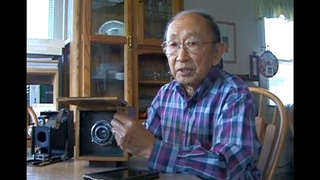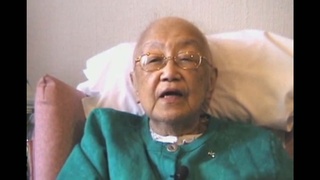Interviews
Family life in a Japanese Canadian internment camp in Slocan
I*: What do you remember of evacuation? Well, it wasn't a very good idea, but like one reason why we got married so soon was my father knew he would have to leave because he was a Japanese national. So my husband and I, we were going around together at that time, and he said he would like us to get married so at least there'd be someone to look after us. So that was right after Pearl Harbor, we became engaged, and got married January the 23rd. And my father had to leave in March. But as you know, things changed and all the men had to go, so that just left my mother and I and my sister. We still stayed at the rooming house until we had to be evacuated. [Interruption] But soon after that, like, Hide Hyoooshu became Mrs. Shimizu, was the supervisor of schools, and she asked me if I'd like to teach. Would have never dawned on me to teach anybody, but she, she gave me a choice of grade three or grade one, so I says, Well, okay, I'll take grade three. And she says, Oh, no, you'll take grade one, that was Hide. But, and it was a wonderful experience. [Interruption] I: And what happened to your Vancouver properties? Well, my father had this, what they called a block. He had a hotel, and there was a restaurant underneath and a couple of barbershops. But all that, he had to sell for a pittance, because, well, the government said they would look after it, but there wasn't much chance of that. I: So you actually were married before the war started, or just as the war was starting, before the evacuation. Yes. Like, we were married in January, and then, well, by March everybody was moving out, and so we thought, well, we better get rid of everything that we could because we couldn't take it with us, and so we had to sell our furniture. And the wedding cards were still in the drawers and that, and the people that came to buy the furniture, they started to cry to see this, you know, that we had to leave all this behind us. But there was no way, no way of getting around it, so I'm sure it happened to a lot of other people. I: So you were reunited with your husband at Slocan. Is that when you started your family? Well, I was already pregnant when we left Vancouver, that was in about August. The baby wasn't quite developed, but I guess the harsh winter and the situation... I: Could you describe family life in Slocan, in an internment camp? In Slocan? Well, everybody was in the same boat, you know. So there wasn't this competition of who had more or less. Everybody tried to help each other out, and, of course, all the Japanese had gardens, they grew vegetables, whatever. In a way, it was great; we had time to take lessons in different kind of Japanese cooking, flower arrangement, and I guess on the whole... well, we were married so we didn't go out, but for the young people, it was a lot of fun because they had a lot of friends, and there wasn't much else to do but have a good time. We managed, though we had only one, like, a shack which we shared, like we were two families, so we were able to share that. In some cases, there were two different families living together. [Interruption] I: And how many people would be in one shack? In one shack? Well, like these shacks -- well, I would say next door, they must have had about eight people. There were five in ours, and then there were two families in the following building. But then there was a bunkhouse for the single men, and then they had to think about building a school for us, and that took a while. So once we started teaching school, we had to march our children to Bay Farm, and I shared their school for a half-a-day, and then marched them home again. Sometimes -- I had grade one classes, so sometimes we'd sit under the apple tree and have fun, or else go walking in the woods, pick apples. But the children were great; they wanted to learn so much. Now, a lot of these families had come from a Japanese community, so the children didn't speak English. But that didn't seem to hinder them. *I indicates an interviewer (Terry Yamada).
Date: October 21, 2004
Location: Toronto, Canada
Interviewer: Terry Yamada
Contributed by: Sedai, the Japanese Canadian Legacy Project, Japanese Canadian Cultural Center











